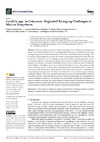Identificador persistente para citar o vincular este elemento:
https://accedacris.ulpgc.es/jspui/handle/10553/132098
| Título: | Candida spp. in Cetaceans: Neglected Emerging Challenges in Marine Ecosystems | Autores/as: | García Bustos, Víctor Rosario Medina, Mª Inmaculada Cabanero Navalon, Marta Dafne Ruiz Gaitan, Alba Cecilia Peman, Javier Acosta Hernández, Begoña María |
Clasificación UNESCO: | 310905 Microbiología 240119 Zoología marina |
Palabras clave: | Bottle-Nosed Dolphins Tursiops-Truncatus Cunninghamella-Bertholletiae Mammals Microorganisms, et al. |
Fecha de publicación: | 2024 | Publicación seriada: | Microorganisms | Resumen: | Cetaceans, which are crucial in marine ecosystems, act as sentinels for ecosystem and human-environmental health. However, emerging fungal infections, particularly by Candida spp., pose a growing concern in these marine mammals. This review consolidates current knowledge on the prevalence, clinical manifestations, species distribution, and antifungal resistance of Candida infections in cetaceans. We detail the diverse pathogenic impacts of Candida, including respiratory, dermal, and systemic afflictions, underscoring diagnostic and treatment challenges amid rising antifungal resistance. Our analysis extends beyond health concerns in captive cetaceans, where confinement stress heightens vulnerability, to encompass substantial ecological risks in wild populations. The review emphasizes the One Health perspective, linking cetacean health with broader environmental and human public health issues. We particularly focus on the potential zoonotic transmission of emerging fungal pathogens such as Candida auris and the role of environmental changes in fostering antifungal resistance. The study underscores the need for concerted, interdisciplinary efforts in veterinary, medical, and environmental sciences to enhance understanding and management of Candida infections in cetaceans. We advocate for comprehensive monitoring and collaborative research initiatives to mitigate the rising challenge of these infections. Addressing Candida spp. in cetaceans is not just a conservation priority but a critical step in safeguarding overall marine health and, by extension, human health in the context of evolving infectious diseases. | URI: | https://accedacris.ulpgc.es/handle/10553/132098 | DOI: | 10.3390/microorganisms12061128 | Fuente: | Microorganisms,v. 12 (6), (Junio 2024) |
| Colección: | Artículos |
Citas de WEB OF SCIENCETM
Citations
6
actualizado el 08-feb-2026
Visitas
2
actualizado el 10-ene-2026
Descargas
2
actualizado el 10-ene-2026
Google ScholarTM
Verifica
Altmetric
Comparte
Exporta metadatos
Los elementos en ULPGC accedaCRIS están protegidos por derechos de autor con todos los derechos reservados, a menos que se indique lo contrario.
